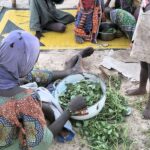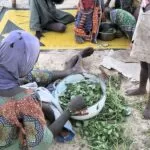
As the global community marks the United Nations’ World Food Day event, Nigeria faces worsening food insecurity, with many more people experiencing severe hunger in 2024 compared to the previous year, according to the World Bank.
World Food Day is an international day celebrated every Oct. 16 to commemorate the founding of the United Nations Food and Agricultural Organisation (FAO) in 1945. But this year’s celebration has met many Nigerians struggling for survival amid rising food inflation.
According to the World Bank’s Food Security Update Report released in September, Nigeria is one of 18 countries experiencing a significant rise in the number of people exposed to increasing starvation “due to factors including intensified conflict and climate-related shocks, such as droughts.”
The report stated that the number of people in Nigeria facing acute food shortage has increased by 28 per cent within the last year. This is the fifth-highest jump recorded by any country after Chad, Zimbabwe, Sierra Leone, and Malawi.
While Nigeria has vast agricultural potential, the country struggles with conflicts, environmental disasters, poor conversation practices, and outdated farming practices, forcing it to rely heavily on the importation of staple foods like rice, maize, and wheat. Northern Nigeria, where most agricultural activities take place, is bedevilled by violent activities by different armed groups, which affect access to farmlands. This has led to scarcity and price surges nationwide, making it increasingly difficult for low-income families to afford essential food items.
The World Bank has called for urgent intervention to address the immediate food needs of the affected countries.
Meanwhile, Nigerians face an even bigger problem. According to the National Bureau of Statistics (NBS), the country’s inflation rate rose to 32.7 per cent in September 2024 from 32.15 per cent the previous month, marking a 0.55 per cent increase. This is a significant leap compared to the inflation rate of 21.34 per cent in December 2022.
The inflation rate was recently propelled by increases in transportation costs and food prices.
“The rise can be attributed to the rate of increase in the average prices of beer (local and foreign) (tobacco class), vegetable oil, groundnut oil, palm oil, etc. (oil & fats class), beef, gizzard, dried beef, etc. (meat class), Lipton, Milo, Bournvita, etc. (coffee, tea & cocoa class) and milk, egg etc. (milk, cheese and eggs class),” NBS said.
“The average annual rate of food inflation for the twelve months ending September 2024 over the previous twelve-month average was 37.53 per cent, which was 11.88 per cent points increase from the average annual rate of change recorded in September 2023 (25.65 per cent).”
Millions of Nigerians living in regions affected by conflict are having to grapple with both the worsening economic conditions and a humanitarian crisis. Nigeria is home to around 3.3 million displaced people and about 31.7 million people are facing high levels of food insecurity. Millions of children are also severely malnourished.
Médecins Sans Frontières’ Nigeria Country Representative, Dr Simba Tirima, said during a press conference in June that the NGO’s staff were resorting to treating patients on mattresses on the floor because their facilities were full.
“Children are dying. If immediate action is not taken, more lives hang in the balance. Everyone needs to step in to save lives and allow the children of northern Nigeria to grow free from malnutrition and its disastrous long-term, if not fatal, consequences,” he said.
“We’ve been warning about the worsening malnutrition crisis for the last two years. 2022 and 2023 were already critical, but an even grimmer picture is unfolding in 2024. We can’t keep repeating these catastrophic scenarios year after year. What will it take to make everyone take notice and act?”
The International Committee of the Red Cross (ICRC) made a similar distress call on Tuesday.
Speaking with HumAngle, Kingsley Ndimele, an agricultural economist, called on the federal government to subsidise farm produce for farmers.
“The government must, as a matter of urgency, show interest in the welfare of its citizens. With the high cost of transportation, there will definitely be an increase in food prices. We can’t expect that a basket of tomatoes should be sold for the same price it used to be sold when petrol was less than ₦500. The logistics that come with transportation of crops make food inflation unavoidable.”
Nigeria is facing increased food insecurity, with severe hunger rates rising significantly in 2024 compared to the previous year, according to the World Bank.
Contributing factors include intensified conflict, climate-related shocks, and heavy reliance on imported staple foods due to outdated farming practices and environmental challenges.
The country also witnessed a sharp inflation rise, driven by increased transportation costs and food prices.
The humanitarian crisis is worsening, with about 31.7 million Nigerians facing food insecurity and millions of children severely malnourished. Aid organizations have sounded alarms about the malnutrition crisis, urging immediate intervention to prevent fatalities.
An agricultural economist has called on the government to subsidize farm produce to mitigate the high food prices aggravated by transportation costs.
